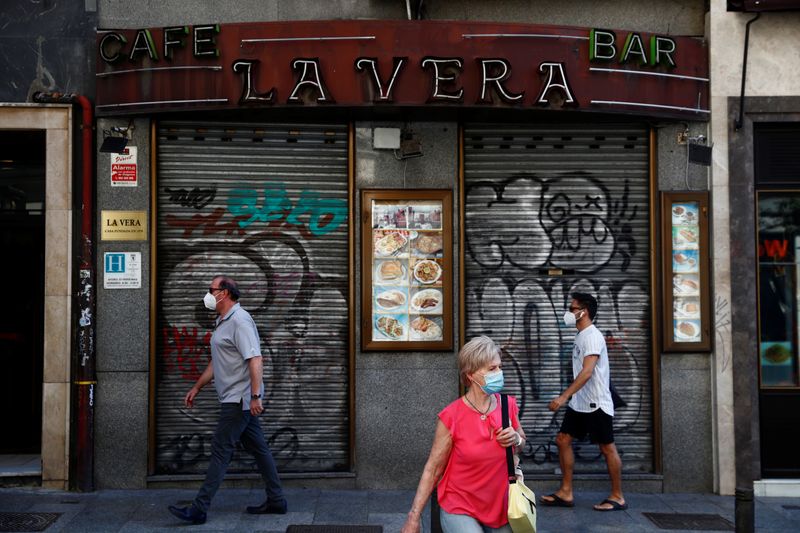By Belén Carreño
MADRID (Reuters) - The coronavirus crisis has pulverised Spain's economy, triggering its worse recession since the civil war, with the depressed state of tourism boding ill for any hopes of a swift rebound.
Hit by one of Europe's worst pandemic outbreaks, followed by one of its strictest lockdowns, the Spanish economy came to a halt in March and stayed largely paralysed until the end of June.
Figures from the National Statistics Institute showed on Friday the economy shrank a historic 18.5% in the second quarter, a drop so harsh it wiped out all the recovery the southern Europe nation had managed to build up since the global financial crisis.
The second-quarter contraction came after a 5.2% drop in the first three months of the year, at that stage the worst quarter on record. Historians say only the 1936-39 civil war hit the economy harder.
While the government had hoped tourists travelling from northern Europe and further afield would help the economy rebound in the third quarter, those hopes have been stymied by worries over the coronavirus, compounded by quarantines and travel advisories.
"Not only has the Spanish economy been one of the worst hit in the euro zone by the pandemic, it also looks set to make a much weaker recovery than its neighbours", said analysts at Capital Economics, pointing to a disappointing start to the summer season.
GREATER BLOW
With the economy in a state of hibernation and most shops closed until some started opening in May, private spending and investment plummeted, inflicting a much greater blow on the Spanish economy than on its European counterparts like France or Germany.
Now the problem is tourism - an issue which is only set to get worse after Germany on Friday put three Spanish regions, including Catalonia, home to Barcelona, on its list of countries designated high-risk for the novel coronavirus.
Though it insists this is not a second wave of the pandemic, Spain has been grappling in recent weeks with a steady increase in coronavirus cases, even if it is still far from the heights of the pandemic.
"To support the recovery, it is essential to contain the new outbreaks," Ana de la Cueva, secretary of state for the economy, said after the second quarter data was released.
The third quarter, expected to mark the start of an economic rebound, will instead be weaker than expected, said Raymond Torres, chief economist of thinktank Funcas.
Torres said Spain might manage to rake in tourist income for the whole of this year what it usually gets in the third quarter alone. Spain depends on tourism for 12.3% of its economic output.
Despite the sharp drop in activity, some sectors recorded positive data, such as agriculture, driven by strong demand for food. A stimulus package and health measures to combat the pandemic also helped boost public spending.

The government has forecast a contraction of 9.2% in 2020 as a whole, surpassing the fall during Spain's 2008-2013 financial crisis, but expects 6.8% growth in 2021.